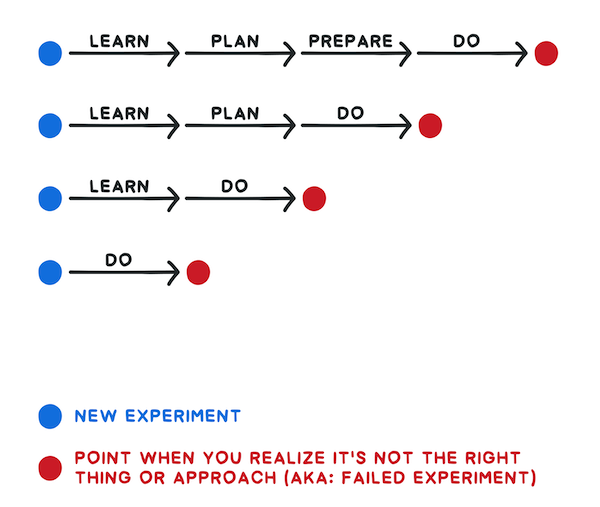A champion is someone you never forget.
They defy the odds and get disproportionally higher rewards. You can be that person.
The illusion is champions in their field have:
- The best ideas
- The best vision
- Natural born talent
- Hardly any failures
Wrong. For the last 9 years, I’ve researched the highest performers in the world and written about them. One trait stands out that you can copy: an execution mindset.
Here’s how to use it.
Borrow this approach from the navy seals
A buddy of mine, Kieran Drew, had a navy seal dad.
The guy was a machine. He told stories of running 50+ mile marathons through rugged terrain worse than the heart of the Egyptian desert. Kieran asked his old man how the heck he could survive these harsh challenges.
If you’re tired, slow down — but never stop.
The aim of the game is to keep momentum going. Even if today is a rough day, the key is to still maintain the execution habit.
As I always say to my wife, I’d rather go to the gym for 10 mins and come home than not go and break my winning streak.
The right way forward isn’t the easy way
There’s a famous Harvard interview with sitcom tv star Jerry Seinfeld.
Jerry got asked whether there was a more sustainable way to produce the Seinfeld tv show. The interviewer bizarrely asked “couldn’t McKinsey have helped?”
He didn’t know who McKinsey was.
Are they funny?
“No.”
Then I don’t need them.
Jerry goes on to explain that his famous tv show was only successful because he micromanaged every element from the edits, casting, scripts, right down to single words.
Non-executors focus on hacks. They want shortcuts. They want an easier way.
But the truth is the hard way IS the way. Because 99% of people will give up when it gets hard and that’s what makes champions reach the top 1%.
Choose hard.
Get great at executing during this odd time
Execution is easy to do on a good day.
That’s not what you want to get great at. As a writer who’s written 5000+ articles on the internet, I’ve found the hardest days to execute are when I don’t feel like it.
So every time I don’t feel like writing I spend extra effort to at least write one thing on these days. Over time it’s had a huge effect.
Yesterday it was 107.6°F (42°C) in my home office. The whole extended family took a day off work to go to the air-conditioned shopping center and escape the heat. I stayed at home and wrote in my office incinerator.
I wore nothing but my underwear and sweat dripped off my head for 8 hours straight. By the end of the day I felt like I’d run a marathon.
This outcome wouldn’t have been possible if I didn’t get great at writing when I didn’t feel like it. Over time I’ve been able to write through literally any hellish scenario.
The days when you don’t feel like doing it are when all the mental muscle is built.
Use this simple strategy to start any big goal (and guarantee a win)
James Clear wrote the book Atomic Habits. This technique of his is powerful to get started
Just start.
Start slow if you have to.
Start small if you have to.
Start privately if you have to.Just start.
Avoid the death spiral of overplanning
Most people overplan themselves into an early grave. Their goals die when they’re 25 and they physically die at 75.
We overplan because it’s easy, and execution is hard.
Planning is often fear in disguise. Planning is procrastination too. You save time and execute on more goals when you shorten failure cycles, according to Janis Ozolins. Here’s what it looks like visualized:

Image Credit-Janis Ozolins via this tweet (follow him, he’s rad)
A failed experiment is a good outcome. It means your execution has produced a result. Now you know what not to do going forward.
The point of execution is to fail so you learn and grow. A self-learner from execution becomes a high earner from lessons learned.
Throw money around like you just don’t care
My writer friend JK Molina says his ghostwriting clients who paid the most money upfront got the most money back from their investment.
Losing money is painful. That’s why if you invest money in real skills that help you execute, you’re a lot more likely to get the result. It’s why online courses with teachers who have social proof generate more results than the same free course on Youtube.
- If it’s free you won’t pay attention.
- If it’s free you won’t value it.
- If it’s free you’ll likely skip a few key steps.
But if you invest money in self-education and there’s a chance you won’t get it back, you’ll do anything (even sell your grandmother’s soul) to ensure a financial loss doesn’t happen.
Use money to keep you accountable for execution of your goals.
Choose one of these two underrated pains
Execution can produce the pain of failure. The antidote is to focus on the pain of regrets.
What will *not* executing do to your future self? How will it feel to never achieve the goal and be on your deathbed knowing it’s too late?
That feeling gives you the free energy needed to execute.
Don’t listen. Copy.
Listening to what hundreds of experts say is overrated. Focus on what successful people DO.
When you copy execution you produce your own results. These results create feedback. Feedback allows for iteration. Iteration improves your execution. This is the formula for success.
Advice is only useful if it’s put to the execution test.
The massive mistake that people make in the age of information is letting knowledge outpace execution — Dan Koe
Transition from the average consumer category to the above-average creator category
We all get to witness cool stuff in our lives.
Most people marvel at the awesomeness and do nothing with it. They consume. A small percentage watch something cool and go “how’d they do that? I want to know.” These are the creators.
I watched people 9 years ago crush it on social media. Many of my work colleagues noticed the trend and did nothing with it. They let the excitement of a new technology fade.
For 9 years, I deconstructed every day exactly how those social media creators achieved their success. Now I have similar results to them, and I’m not smart or born with a rich trust fund daddy.
Don’t just watch. Deconstruct the ingredients of someone else’s success and join the creator category.
Master “activation energy”
Getting started is the hardest part.
When you go to execute on a goal a picture forms in your head. If the picture feels overwhelming then the energy to get started will be enormous. If the picture in your head feels easy then the activation energy needed won’t be much.
The time to execute the goal plays a part too. If it takes you 8 hours to do the task and it’s a struggle, next time you go to do it, the feeling returns.
The solution is to make sure you execute at speed.
Speed of execution means the next time the same task needs to be done, it’ll feel piss-easy in your head. That feeling creates momentum. Momentum compounds results.


